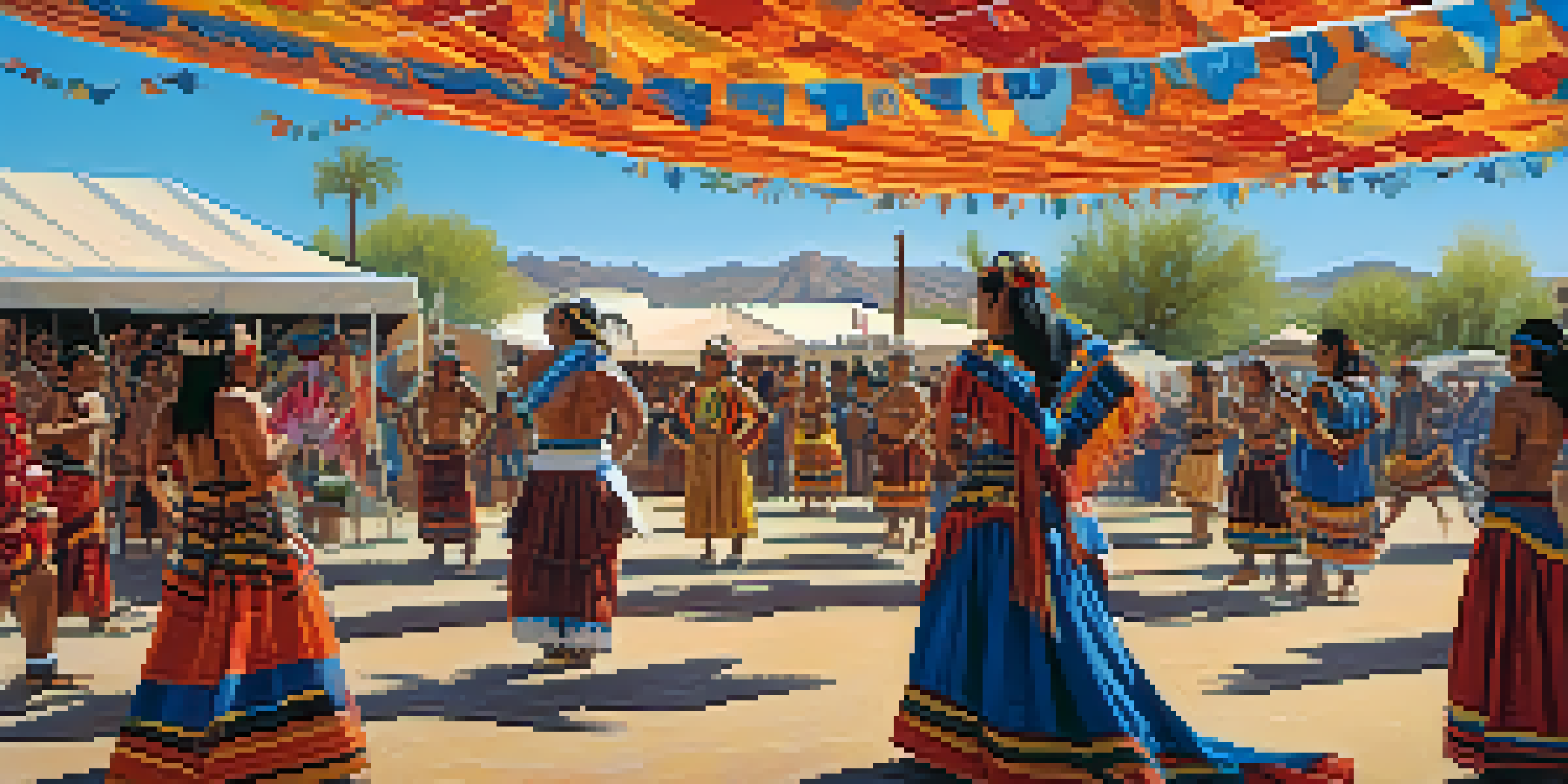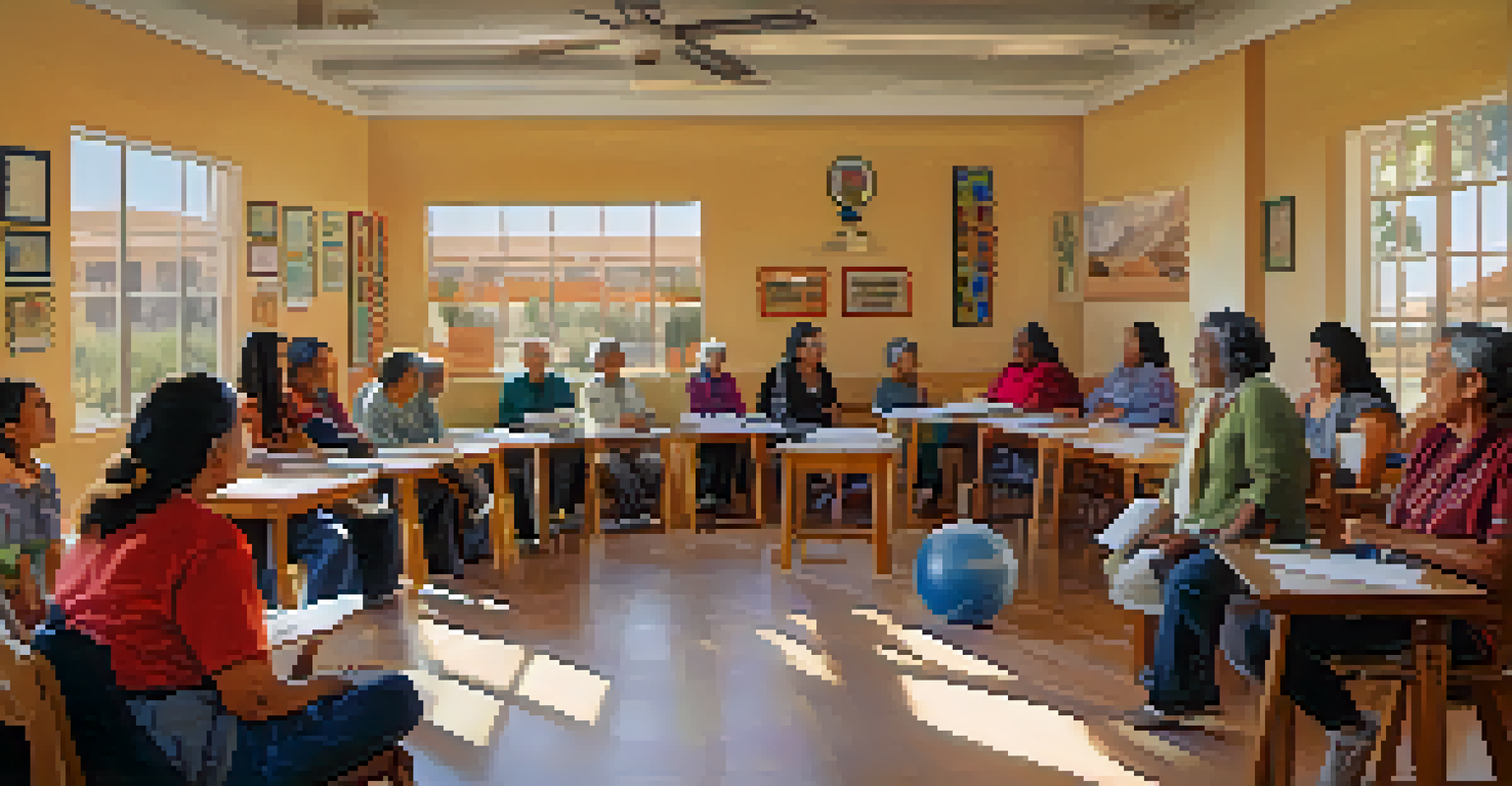Cultural Identity and Language in Tucson's Indigenous Communities

Understanding Cultural Identity in Indigenous Communities
Cultural identity is a cornerstone of community life among Tucson's Indigenous peoples. It encompasses shared values, traditions, and histories that bind individuals together. For many, cultural identity is not just about heritage; it's also about the daily practices that keep their traditions alive.
Language is the road map of a culture. It tells you where its people come from and where they are going.
In Tucson, Indigenous communities celebrate their cultural identity through various events and gatherings, such as powwows and festivals. These occasions are vibrant displays of art, music, and dance that reflect their unique histories and experiences. They provide a space for individuals to connect, share stories, and pass down traditions to the next generation.
Moreover, cultural identity helps foster a sense of belonging and pride. For many Indigenous individuals, their identity is intricately tied to the land and their ancestors, creating a deep-rooted connection that influences their worldview and community dynamics.
The Role of Language in Cultural Expression
Language is a vital part of cultural expression in Tucson's Indigenous communities. It serves as a vehicle for storytelling, preserving history, and transmitting knowledge. Many Indigenous languages are rich in nuance, capturing concepts and ideas that can be lost in translation.

For example, the Tohono O'odham language contains words that reflect the unique relationship its speakers have with their environment. This connection to the land is not just linguistic but also cultural, as it embodies the values and beliefs of the Tohono O'odham people. Language thus becomes a living entity that evolves while still honoring its roots.
Cultural Identity Unites Communities
Cultural identity serves as a foundational element for Tucson's Indigenous peoples, encompassing shared values and traditions that foster a sense of belonging.
Efforts to revitalize Indigenous languages are crucial in maintaining cultural identity. Language classes and community programs are helping younger generations learn their ancestral languages, ensuring that these rich forms of expression continue to thrive and contribute to their cultural heritage.
Challenges Facing Indigenous Languages Today
Despite the importance of language in cultural identity, Indigenous languages in Tucson face numerous challenges. The impact of colonization, assimilation policies, and globalization has led to a decline in native speakers. This loss not only affects the language but also diminishes cultural practices that are closely tied to it.
Cultural identity is a dynamic and evolving process, one that is continually shaped by history and experience.
In Tucson, many community members are aware of this linguistic decline and are working to combat it. Initiatives such as language immersion programs and online resources aim to engage both youth and adults in learning their ancestral languages. These efforts are vital in reversing the trend of language loss and promoting cultural continuity.
However, resources are often limited, and many communities struggle to secure funding for language preservation efforts. The ongoing challenge is to find sustainable ways to support language learning while fostering a broader appreciation for the cultural significance of these languages.
Cultural Events as Language Preservation Tools
Cultural events play a significant role in preserving both language and identity within Tucson's Indigenous communities. Festivals, ceremonies, and community gatherings often incorporate traditional languages, providing a platform for speakers to share their knowledge. These events celebrate cultural heritage and foster intergenerational connections.
For instance, during events like the Tucson Meet Yourself festival, visitors can engage with Indigenous culture through language workshops and storytelling sessions. These opportunities not only educate attendees but also empower Indigenous speakers to share their language with a broader audience.
Language is Key to Cultural Expression
Indigenous languages play a crucial role in preserving cultural identity, acting as vessels for storytelling and the transmission of knowledge across generations.
Such cultural events are crucial for strengthening community ties and ensuring that language remains a living aspect of cultural identity. They create a vibrant atmosphere where both language and culture can flourish, encouraging participation from all ages.
The Interplay of Modernity and Tradition
In today's fast-paced world, Tucson's Indigenous communities navigate the delicate balance between modernity and tradition. Many individuals find themselves blending contemporary practices with traditional values, creating a unique cultural tapestry. This interplay can be seen in art, music, and daily life, where traditional elements coexist with modern influences.
For instance, some Indigenous artists incorporate traditional motifs into contemporary art forms, bridging the gap between past and present. This fusion not only honors their heritage but also makes cultural expressions more relatable to younger generations. It opens up new avenues for dialogue and understanding within and outside the community.
However, this blending of cultures also raises questions about authenticity and preservation. As communities adapt to changing times, they must consider how to maintain their cultural integrity while embracing new ideas and practices.
The Importance of Community Engagement
Community engagement is crucial for the preservation of cultural identity and language among Tucson's Indigenous peoples. Collaborative efforts within and outside the community can lead to positive outcomes, fostering a sense of ownership and pride in cultural heritage. Engaging youth, in particular, is essential for ensuring the survival of languages and traditions.
Organizations and local leaders often encourage participation in cultural programs, workshops, and language classes. By involving community members in these initiatives, they strengthen connections to their heritage and empower individuals to take an active role in cultural preservation. This participatory approach creates a supportive environment where people feel valued and invested in their cultural identity.
Community Engagement Drives Preservation
Active participation in cultural programs and initiatives is essential for the preservation of language and cultural identity among Tucson's Indigenous communities.
Moreover, partnerships with educational institutions and local governments can enhance these efforts. By working together, communities can tap into resources and expertise that further their goals, ensuring that cultural identity and language remain vibrant for future generations.
Looking Ahead: Future Generations and Cultural Identity
The future of Tucson's Indigenous communities hinges on the commitment to preserving cultural identity and language. As younger generations become more involved in cultural initiatives, there is hope for revitalization and growth. Their enthusiasm and fresh perspectives bring new energy to age-old traditions, ensuring they remain relevant.
Additionally, technology plays a key role in this evolution. Digital platforms and social media can help spread awareness and engagement, allowing for broader conversations about cultural identity. Online resources for language learning and cultural exchange can reach individuals who may not have access to traditional resources.

Ultimately, the strength of Tucson's Indigenous communities lies in their resilience and adaptability. By embracing both their rich heritage and modern innovations, they can continue to thrive and ensure that their cultural identity and languages endure for generations to come.